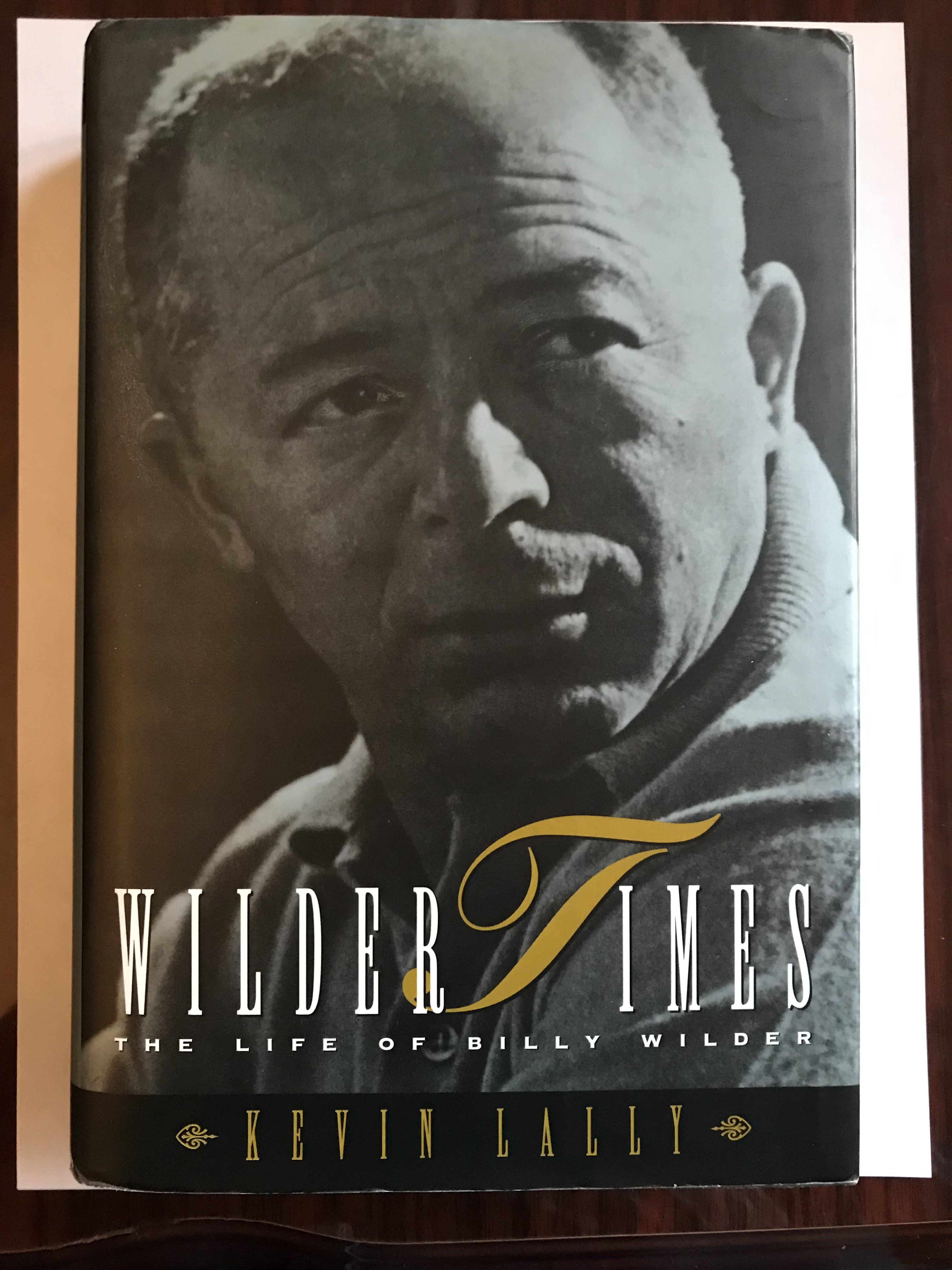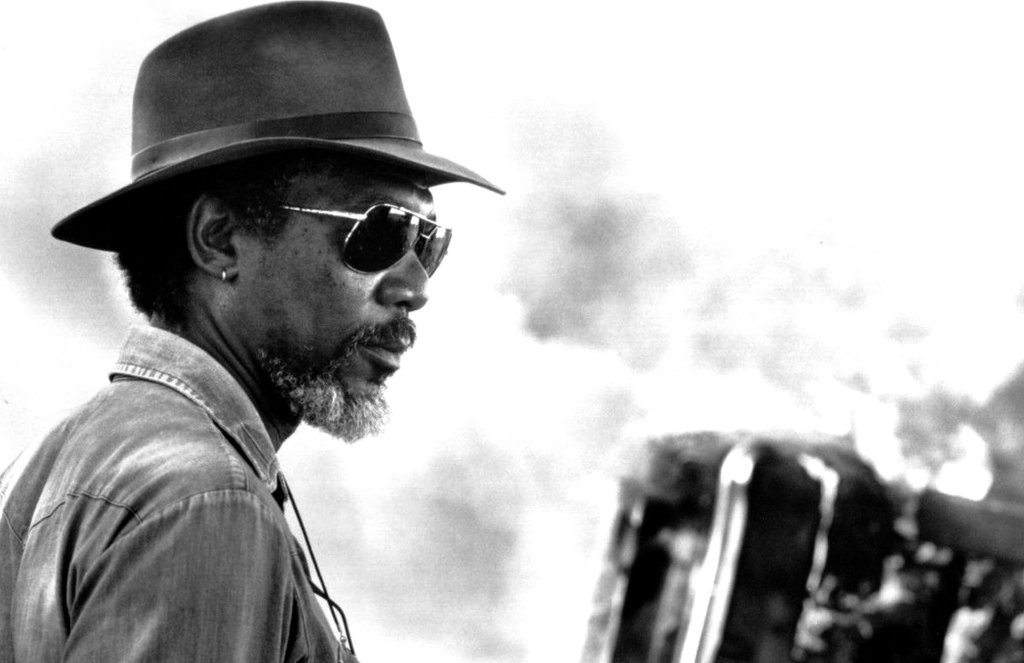Unlike consumer-oriented magazines about the entertainment business, Film Journal generally did not profile movie stars unless they also were aboard a project as a producer or director. So this 1993 interview with one of the most celebrated and enduring contemporary stars focused on a movie few people remember, his one and only feature directing gig, the South African drama Bopha! Morgan Freeman’s next project as an actor would be a little movie then known as Rita Hayworth and the Shawshank Redemption.
Morgan Freeman was 50 when he finally started getting some of the attention he’d long deserved. A gifted veteran of the New York stage, he was best known till then for his stint as “Easy Reader” on the 1970s PBS children’s series “The Electric Company.” Then came Street Smart, the 1987 thriller in which his riveting performance as a volatile pimp dazzled critics and earned him an Oscar nomination as best supporting actor. Within two years, Freeman was a full-fledged movie star, appearing in four major 1989 films: as controversial high school principal Joe Clark in Lean on Me; as a cagey New Orleans cop in Johnny Handsome; as a level-headed Civil War soldier in Glory; and as the elderly chauffeur in Driving Miss Daisy, earning his second Oscar nomination. Freeman then gathered more box-office clout as Kevin Costner’s Moroccan sidekick in Robin Hood: Prince of Thieves and as Clint Eastwood’s loyal friend in last year’s best picture winner, Unforgiven.
Now, at age 56, Freeman is making his feature directing debut with Bopha!, a searing drama centered around a Black police sergeant and his family in South Africa in 1980. Danny Glover, Alfre Woodard, Maynard Eziashi, Malcolm McDowell and Marius Weyers star.
Visiting New York on a particularly sultry summer day, the tall, lanky actor-turned-filmmaker looks dapper in a brown fedora, green shirt, and gray jeans. He reveals that his decision to direct “sort of jelled over a period of time. I met some collaborative directors whose ear you could whisper into concerning shots, lighting, etc. I found the directors I like the most are the ones with the biggest ears—people like Walter Hill, Bruce Beresford, and Clint Eastwood. [On that last name, he looks skyward and blows an imaginary kiss.] I learned a lot from people who listen, and I’ve been told on more than a few occasions: You’ve got good instincts, and maybe you should try this. So I tried it.”
Freeman says his initial fears about being a directing novice were baseless, “because I didn’t need to know that much. I wound up with an excellent line producer, and your line producer is the heart and soul of your whole crew. Their crew were so wonderful to me, personally. I remember I came in one day and said: ‘I don’t know how we’re going to shoot this. Anybody got any ideas, speak up now.’ And in 15, 20 minutes, we had the whole thing laid out… You don’t have to play God, you’re not supposed to play God. The best way to make a movie is to let all the people who know how to make a movie do it.”
Friedman’s crew on Bopha! included two Oscar winners, cinematographer David Watkin (Out of Africa) and editor Neil Travis (Dances with Wolves). He also knew he “had a winner” in the combination of stars Glover and Woodard, who worked together previously in HBO’s Mandela and Lawrence Kasdan’s Grand Canyon.
Glover plays Micah Mangena, a Black man who has found a stable, respectable place in South African society by serving as one of its enforcers. Eziashi is Micah’s son, Zweli, a budding activist against the apartheid system. Woodard plays Micah’s wife, Rosie, who struggles to keep her family together and comes to realize that her husband’s position has turned them into social pariahs.
Freeman frankly admits that he wasn’t initially satisfied with Brian Bird and John Wierick’s screen adaptation of South African writer Percy Mtwa’s stage play, which takes its name from the Zulu word for “arrest” or “detain.” “The situation with the father was kind of Americanized,” Freeman recalls. “They were leaning more toward ‘The Brady Bunch’—a happy marriage, and a jocular father and son. I said that’s not the way it works. Then we went over there and did personal research, and discovered that the father in a South African home is God, and the son is Jesus, and the mother is whatever she can be. It doesn’t go father, mother, son—it’s father, son, mother. Particularly in this sort of situation, where the father is a policeman in a violent world, it’s an iron-fisted-rule kind of thing. So we had to kind of harden up the character of Micah a little more, make him less sympathetic. He’s still sympathetic—you go with him because he’s doing his best, but he isn’t right.
“Percy lived this—his father was a policeman, and Percy, of course, is an anti-apartheid activist. So this is primarily his story. In the play, the relationship between father and son is very strained. That’s another thing we had to go for in the script. We brought the writers over, and we argued and talked and brought the script closer to what we thought it should be, in South African terms.”
Freeman sees a two-way dynamic between people like the Mangena family and the power structure that tries to keep them in line. “They are the forces that are controlling the situation,” he asserts. “How they get through life affects the government and apartheid—whether or not they acquiesce and go along, or somehow rise up and defeat it. But the very act of doing that creates this dreadful threat, this chaotic effect that the rest of Africa seems to be going through. There’s a need for people to be self-expressive, free from the yoke of outside control—but I fear for that. I don’t believe that Africa is going to be in the 21st century along with the rest of this industrialized world. I think Africa is going to have to go back and reassert its own historical self, without the overlay of the colonial self.”
One of the refreshing things about Bopha! is that, unlike films with Caucasian leads like Cry Freedom and The Power of One, it’s a story of South Africa centered around Black characters. Freeman had a supporting role in The Power of One, and he notes, “The book was a lot blacker—that’s why I got involved. I mistakenly and arrogantly thought that they wanted my input because of the nature of the story, but it didn’t work out that way. The movie turned out fine, but it could have been much better.”
After years of performing in small New York theater workshops, Freeman made his Broadway debut in 1967 in the all-Black production of Hello, Dolly! Instead of going to Hollywood and cashing in on the blaxploitation craze, he found fame with the nation’s youngsters as the smooth Easy Reader on “The Electric Company.” Freeman stayed with the show for five years, to his regret.
“I couldn’t break free—I was too scared, too insecure. I stayed with the gig ’cause I had a yacht, I had kids in primary school. But I wanted out!” The actor felt creatively stifled: “You get this persona. You become Archie Bunker, or Captain Kangaroo. You can’t get on the stage, you can’t get into movies, you can’t do anything else because the world pigeonholes you, puts you in a slot. And I don’t belong in a slot.”
As for directing again, he says, “No, I’ve done it. It takes too long. It took a whole year to make a film! And as soon as you finish that one, you’ve got to start another one.” A devotee of sailing and horseback riding, Freeman cheerfully adds, ‘It doesn’t give you any play time, and I’ve got all these toys…”
Bopha! is available to stream on Kanopy.


Leave a comment